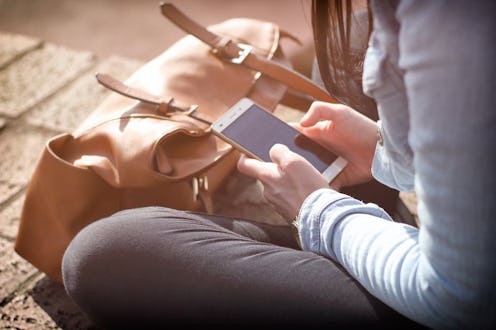Life
Do Period Tracking Apps Actually Work?
When period-tracking apps started to become popular, I really thought we might have finally found a reliable form of non-hormonal birth control. But do period tracking apps work? Well, the answer certainly isn't clear-cut, but new research suggests that you might not want to rely soley upon them as a method of preventing pregnancy.
Discussions revolving around access to birth control has been in the news for all the wrong reasons recently, thanks to extremely distressing vote in the United States House of Representatives to repeal the Affordable Health Act and replace it with the American Health Care Act. (The bill still has to pass the Senate before it becomes law.) Intrauterine devices (IUDs) have jumped in popularity as many Americans seek to obtain a long-term contraceptive that can last Trump's presidency — but if coverage for contraceptives is no longer required to be included in plans, period-tracking apps might seem like a good backup plan in lieu of, you know, actual access.
Period tracking apps are available for both iPhone and Android, are often free, and are typically easy to use. Some are just simple digital calendars in which you can place your own reminders. Others help keep track of cervical mucus and body temperature so people can more accurately predict ovulation time. Many apps also help you learn about your cycle length as so you can predict your next period.
But apparently, herein lies the problem. A new study from the University of Washington has found that menstrual cycle tracking apps are inaccurate for a lot of people — especially those with irregular cycles.
Researchers looked at a survey of 687 people and analyzed 2,000 reviews of a selection of popular period-tracking apps. Their findings? Not one of the apps could be deemed 100 percent reliable when it came to helping people keep track of their periods accurately. Study co-author Nikki Lee explained that the apps weren't wired in an advanced enough way to be deemed reliable if someone misses their period. “In some cases, you don’t have a way to go in [to the app] and say I missed my period because of x reason or because I was in the hospital — both ordinary and exceptional circumstances can screw up the algorithms because they’re not really robust,” she said in a press release.
This also means that those who suffer from irregular periods aren't really able to use the apps as a fail-safe method of preventing pregnancy. And as Lee explained, that makes them the least helpful to those who need them the most: “The apps are most accurate if your cycles are really, really regular, but the people who most need an app are the people whose cycles aren’t regular," she said.
The apps also attracted criticism from study respondents for their pink and flowery designs. "App designers often assume that the person tracking their menstrual cycle identifies as female," the study authors said in their paper; however, cisgender women aren't the only people who menstruate, and are therefore not the only people who might find a period tracker useful. Indeed, the study noted that one respondent struggled to "find a period tracker that didn’t misgender me."
Lead study author Daniel Epstein, a doctoral student at the University of Washington’s Paul G. Allen School of Computer Science & Engineering, observed that overall, respondents weren't very happy with most period tracker apps. “People didn’t feel like the apps were very good at supporting their particular needs or preferences," he said in a press release. "People felt they were better than tracking their periods on paper, but still weren’t great in a lot of basic ways.”
So whether you're trying to avoid pregnancy, or attempting to get pregnant, or just feel like knowing when your monthly visit from Aunt Flo is set to befall you, it appears that period tracking apps may not be the most reliable way to accomplish your goals — and, honestly, that's a problem. Furthermore, the fact that the developers of these apps are still framing periods around unnecessarily gendered pink and fluffy interfaces is equally problematic, as it limits the entire discussion around menstruation to only one group (cisgender women) of the many people in the world who actual menstruate
So what can we do to fix these problems? The study authors urge app creators to design "for inclusion, acceptable accuracy, and discreetness in personal informatics." Too right. But until then, I guess it's back to the traditional calendar and pen for period tracking, or maybe see your healthcare provider for new options.
